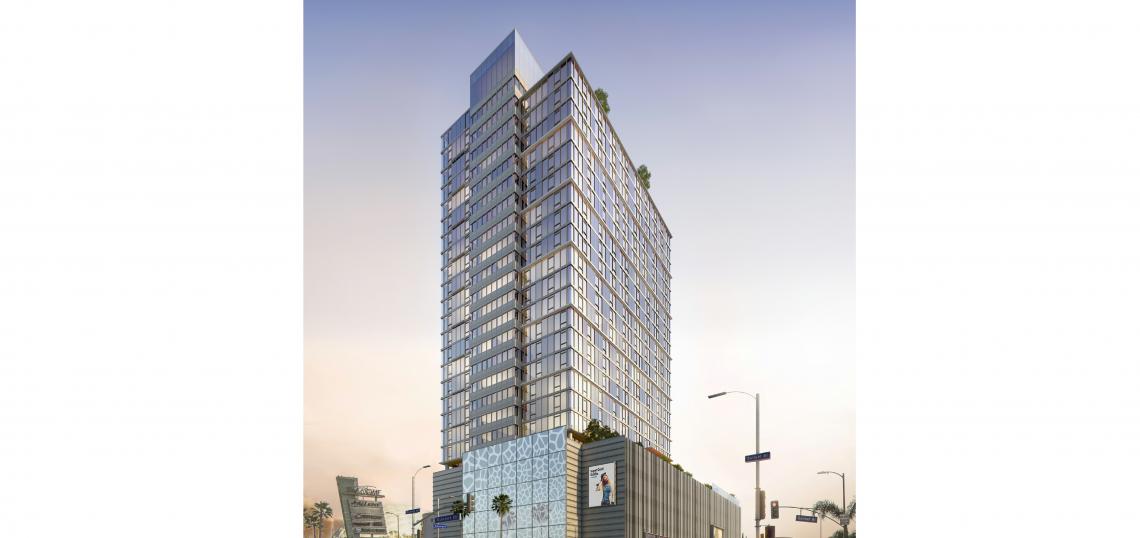A proposal to redevelop the Hollywood outpost of Amoeba Music with an apartment tower cleared a hurdle today, when the Los Angeles City Planning Commission voted to reject an appeal seeking to halt the project.
GPI Companies, which purchased the property at 6400 Sunset Boulevard from Amoeba in 2015, intends to replace the nearly 20-year-old record store with a 26-story building featuring 200 residential units - including 10 affordable units - above a podium with parking and 7,000 square feet of street-fronting retail space.
Amoeba has announced its intent to relocate elsewhere in Hollywood, though an exact location has yet to be specified.
The tower that would replace its current home is being designed by Johnson Fain. Architectural plans show a modern glass tower, rising approximately 265 feet in height, with amenities including outdoor decks at the roof and podium levels, a swimming pool, and a fitness center. The podium would be wrapped will with metal panels and louvers, and signage as allowed by the Hollywood sign district.
The appeal by the Coalition to Preserve L.A., an organization affiliated with the AIDS Healthcare Foundation, argued that the City Council erred in designating the 6400 Sunset development Sustainable Communities Project, thereby exempting it from the need for a full environmental impact report. Additionally, the appellant contended that the project does not meet the affordable housing requirements stipulated by the Hollywood Redevelopment Plan, and that the project should be halted until the approval of the new Hollywood Community Plan.
A staff report also rejected the appellant's assertions regarding the project's Sustainable Communities Project Exemption, arguing that the proposed tower met the requirements for the designation due to the proposed programming of the building and its location in an already-developed area within a half-mile of a major transit stop.
Edgar Khalatian, an attorney from Mayer Brown representing GPI Companies, responded to the Coalition's comments by noting that the affordable housing requirements of the Hollywood Redevelopment Plan are written to apply cumulatively for the entire plan area - not for each individual project.
Public commenters, largely consisting or representatives of pro-housing organizations and construction trade unions, expressed support for 6400 Sunset.
A representative of the Health Housing Foundation - also an affiliate of the AIDS Healthcare Foundation - argued that the existing Amoeba building should be landmarked due to its eye-catching design, despite being under 20 years old.
Craig Bullock, Planning Director for City Councilmember Mitch O'Farrell, expressed the Council Office's support for the project, stating that the developer had agreed to contribute $2.5 million to the district's affordable housing trust fund.
Commission members voted unanimously to reject the appeal of the 6400 Sunset development, but had more difficulty reaching a consensus on the design of the proposed tower, with several expressing distaste with its above-grade parking structure - particularly its appearance along Cahuenga Boulevard.
Khalatian responded that GPI Companies had taken every avenue available to them to reduce the amount of parking required for the project, and that placing more of the garage underground would extend its construction timeline and increases costs. Additionally, he stated that the dimensions of the development site are too narrow to allow for habitable uses to wrap the exterior of the garage.
Architect Scott Johnson suggested alterations to exterior finishes and improved lighting as a way to make the design of the podium more palatable.
The Commission ultimately voted to move the project forward, on the condition that GPI Companies improve upon the design of the building's parking podium and report back to the Commission on its efforts at a later date. Additionally, the applicant agreed to price the affordable units for households at the extremely low-income level - those earning 30 percent or less than the area median income - rather than the very low-income level - those earning 50 percent or less.
The Coalition to Preserve L.A. and AIDS Healthcare Foundation have been steadfast opponents of large developments in Hollywood. A lawsuit previously filed by AHF against developer Hudson Pacific Properties resulted in a settlement in which an office building now under construction near Sunset Bronson Studios was shortened and stripped of a ground-floor grocery store. The non-profit is also suing the recently-approved Crossroads Hollywood development, which would rise near the intersection of Sunset and Highland Avenue.
GPI's proposed tower at the Amoeba site could be joined in the near future by a 21-story hotel tower slated to replace a Jack-in-the-Box restaurant across the street.
Just south of 6400 Sunset, construction three large projects are also underway: the Godfrey Hotel, The Rise Hollywood, and the $450-million Academy development - which has been leased by Netflix.
- 6400 Sunset Archive (Urbanize LA)







